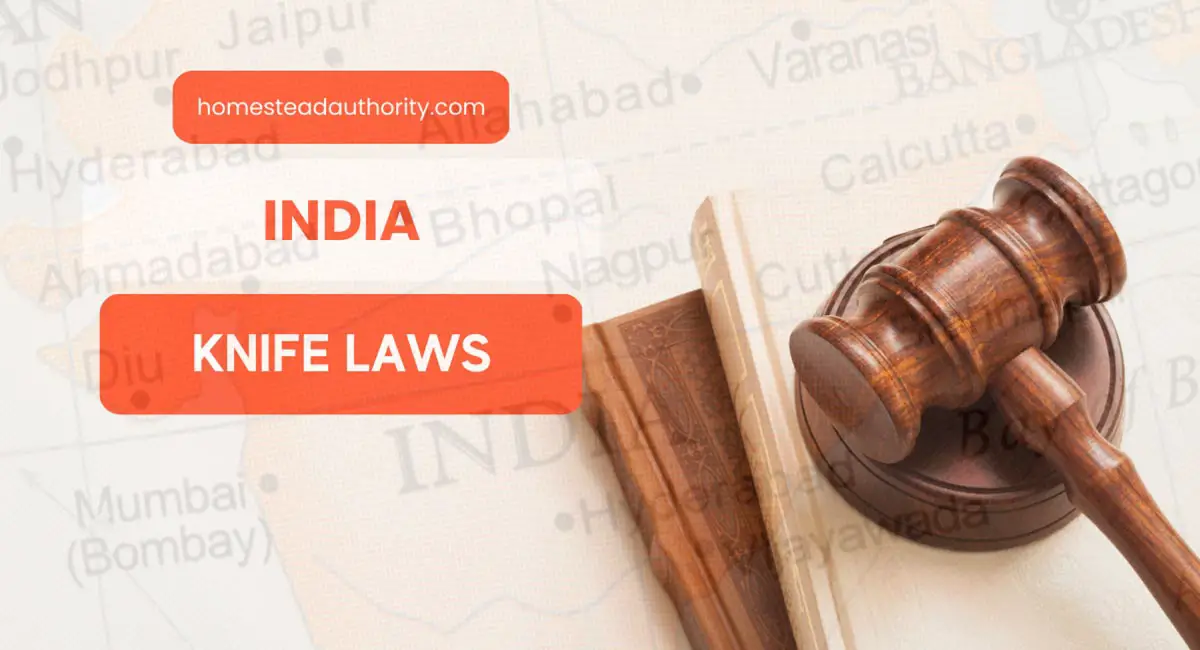India Knife Laws – Things To Know Before Purchasing Or Using A Knife
The knife laws in India are pretty complex. However, it is intended to ensure public safety or prevent misuse. The government has already been informed that certain types of knives are prohibited in the country. Here are also a paper named “Laws governing a Knife”
The Indian Penal Code, among other laws such as the Arms Act and Custom and Excise Act, governs the regulations on knives.
It’s crucial to note that knife laws may differ between states in India, so it’s important to familiarize oneself with the local regulations before owning a knife.
This article lists the knives that are mostly illegal to use, carry, or make. Additionally, we have included information on the penalties associated with using these restricted knives.
Highlights
Here are a few facts about knife laws in India. Don’t forget to check them if you want to learn more about them.
- Statewide preemption: The state government regulation of knives is not preempted in about half of the states.
- Permission in School: It is illegal in India to carry a knife (blade) in school.
- knife’s critical dimension in Indian law: blade/knife Size more than 9 inches long and 2 inches wide would be illegal to carry. Anything less won’t cause any problems.
Statistics About Knife Related Crimes in India
According to a report by the United Nations Office on Drugs and Crime, knife attacks account for 22 percent of total deaths globally, making knives one of the most commonly used weapons across countries.
In India, knife attacks are even more prevalent, resulting in the country being ranked third on the list of countries in 2019 with the highest number of stabbing deaths.
List of Illegal Knives in India
There are a few knife types in India that the Indian government governs. There should be no production, sale, or use of these knives. Anybody who does that will be held accountable.
A small list of knives was mentioned as being forbidden to use or carry by the Arm Rule 1962. The list is provided below.
Swords
A sword is a long-bladed, handle-equipped weapon that is typically made of metal. It has a sharp edge. Sometimes the inner and outer edges are used to frighten or attach people. Along with this sword, carrying a sword stick in public is also forbidden.
The reason is that, when concealed by a cover, the sword knife and sword stick (also known as a walking stick) appear to be identical. Because of the potential for abuse, the Indian government also outlawed the sword stick.
Dagger
Dagger is basically a fighting knife with both side of the blade is sharp. It main purpose of this knife is stabbing. That’s why its illegal.
Machetes
Although machetes are agricultural tools its also used as weapons. It’s quite bigger than other knives and heavy as well. Also, machetes have different shape and size.
Throwing Knives
They are often used in military combat and are characterized by their versatility in terms of shape and design. Since its primary function is fighting, the general public cannot use it.
Bayonets
Bayonets are a type of knife used by the military as an attachment to the end of a firearm for close combat fighting. They are designed similarly to daggers, but because they are not a good purposeful tool, they have become illegal.
Spears
In knives, spear knives are long, thin blades that are designed for thrusting or stabbing. This is also a fighting weapon.
Switchblade Knives
This is a particular style of automatic knife that typically folds inside the handle. The blade emerges instantly after pressing the button. This is a carry-on combat knife as well. And combat knives are highly discouraged.
Scalpels
Scalpels are referred to as medical knives. Although the scalpels are small, they have very sharp blades because they are primarily used to cut through body tissues and organs.
Bowie Knives
The Bowie knife is widely recognized as a hunting knife due to its sturdy construction and sharp blade. This knife is considered illegal, but there are some exceptions.
Stilettos
The stiletto is a unique type of knife with a long, slender blade with a needle-like point. This type of knife is sometimes referred to as a dagger in certain regions. The stiletto is primarily used as a weapon for stabbing and is considered a valuable tool for those who seek to inflict harm
Areas Where The Knife is Illegal
According to the Indian Arms Act of 1959, it is illegal to carry a knife of an unauthorized size. The following are places where carrying a knife without a license or permission is prohibited:
- Public Places: Carrying a knife in public without a valid reason is illegal and may result in arrest.
- Educational Institutions: Carrying a knife on the premises of any educational institution, including schools, colleges, universities, and madrasas, is strictly prohibited. The violators will face legal consequences.
- Transportation Hubs: For security reasons, it is illegal to carry a knife in major transportation hubs such as airports, railway stations, and metro stations.
- Government Institutions: Bringing a knife into a government institution is a punishable offense.
Illegality in Local/State Governments
In India, the term “local government” refers to the administrative structure in charge of overseeing the more compact administrative divisions found within each of the nation’s states and territories.
Local governing bodies can be established at the village, taluk (tehsil), district, and state levels under the Indian Constitution.
In India, there are three different levels of government: central, state, and local. Local governments function on a village or town level, state governments function on a state level, and the federal government functions on a national level.
Illegality Based on Concealed and Open Knives
In India, it is illegal to carry a knife in public, whether it is concealed or carried openly. The legality of carrying a knife may depend on the circumstances, but initially, it is considered a violation of the law.
The Illegality of Carrying, Possessing, Selling, Manufacturing, Importing, and Trading in India
The Indian Arms Act of 1959 regulates the laws regarding the carrying, possessing, selling, manufacturing, importing, and trading of knives in India.
As per the law, possessing a knife requires a valid license. Anyone found carrying or storing a knife without proper evidence or license may face legal consequences.
Knives manufacturing, selling, and trading also require a valid business license. Without this, no individual or business can produce or trade knives in India.
Penalties and Punishment for Carrying Illegal Knives (Intimidating or Threatening with The Help of a Knife)
In India, it is illegal to have or use knives that are not legal, and doing so is punishable by law. Depending on the case’s specifics and the crime’s seriousness, different penalties may be imposed for using an illegal knife.
It could be anything from a fine or jail time to more severe penalties like life in prison or, in extreme circumstances, the death penalty.
In India, using a knife in a manner that disturbs public peace can result in criminal charges. According to the Indian Penal Code (IPC), Section 425,
- A person who brandishes a knife as a weapon and threatens another person without the intention to cause harm can be charged and face jail time.
Additionally, Section 268 states that creating a disturbance with the use of a blade or sharp knife can also result in criminal charges. It is important to note that using knives in a manner that poses a threat to others is taken seriously by the government and can result in serious consequences.
Which are Legal Knives in India?
In India, there is no official list of knives deemed legal for use in all circumstances. Kitchen, cutlery, pocket, and multi-tool knives can be carried legally.
Regarding legal knife length, the act specifies that a knife with a blade length exceeding 9 inches or a blade width exceeding 2 inches will be considered illegal to carry.
However, some restrictions may be in place to accommodate religious customs and beliefs. In these cases, specific groups may be able to carry knives according to their religious laws.
It is important to note that knife laws can vary from state to state in India, and what is legal in one state may not be legal in another. Therefore, it is crucial to be aware of the local knife laws in your area to ensure that you are not violating any regulations.
Exceptions in the Knife Law of India
In India, knife laws are subject to a few exceptions. See what these laws are.
- Religious purpose: If a knife is associated with religious laws and is used in a respectful and peaceful manner, the Indian government will not interfere. For example, kirpan knives are allowed to be carried by the Sikh religious community.
- Lawful purpose: Knives can be utilized for various purposes, such as for agricultural work, cutting fish, or for industrial use in different tasks. But a knife has to be the legal one.
- For self-defense: Carrying a knife for self-defense is generally prohibited. But the laws may be in your favor if it is used in an unavoidable situation.
FAQs
Here are a few more questions and responses related to Indian knife laws. Give this section a read if you’re curious to learn more.
Are kirpan knives permitted in India?
The Kirpan is a ceremonial knife that is used by Sikhs as part of their religious practices. The Indian government recognizes the Kirpan as a legal object.
However, there may be restrictions on the size of the Kirpan that can be carried in public. Sikhs are allowed to carry the Kirpan in public
It should be noted that while the Kirpan is legal, some states in India may have specific laws against it. Therefore, it is important to be aware of the local laws and regulations before carrying the Kirpan in public.
Is it legal to carry a knife in a car in India?
While there is no specific law against carrying a knife in a car, carrying a restricted knife into a public place could be considered a violation of the law.
On the other hand, if you carry a standard knife, such as a kitchen knife or a pocket knife, in your car for personal use, it is not considered a violation of the law.
Is there any laws/duty of importing knives in India?
Yes. if you want to import knives that are legal, you have to pay the import duty to the government. According to the Indian custom duty chapter 82, HS code (Harmonized code) 8211 , the importer has to be paid 10% basic duty, 12% IGST and 10% social welfare surcharge on knives with cutting blade
Final Words
We hope we could provide you with the information you wanted about knife laws in India.
In conclusion, the knife laws in India are somewhat more rigorous and complex than in other countries. Due to the diversity of knives available, it is challenging to regulate them effectively under one set of laws.
This is why the local government in India has established its own set of regulations on knives within their respective regions.
Therefore, it is advisable to familiarize oneself with all the knife laws in India before considering using, carrying, or producing knives.







